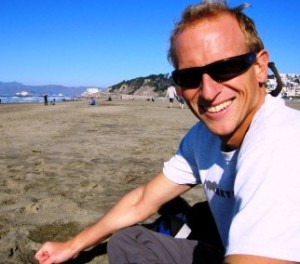 In Tyler McMahon’s debut novel, How the Mistakes Were Made, Laura Loss comes of age in the 1980s hardcore punk scene, the jailbait bassist in her brother Anthony’s band. While on a reluctant tour through Montana, Laura meets Sean and Nathan, two talented young musicians dying to leave their small mountain town. With these two men, Laura forms the Mistakes, and at the height of their fame, the volatile bonds between the three explode. Hated by the fans she’s spent her life serving, Laura finally tells her side of how the Mistakes were made.
In Tyler McMahon’s debut novel, How the Mistakes Were Made, Laura Loss comes of age in the 1980s hardcore punk scene, the jailbait bassist in her brother Anthony’s band. While on a reluctant tour through Montana, Laura meets Sean and Nathan, two talented young musicians dying to leave their small mountain town. With these two men, Laura forms the Mistakes, and at the height of their fame, the volatile bonds between the three explode. Hated by the fans she’s spent her life serving, Laura finally tells her side of how the Mistakes were made.
Jonathan Evison (West of Here, All About Lulu) praised the book, noting that “[w]ith the velocity and conviction and frenetic pace of a punk anthem, McMahon has captured perfectly the life cycle of a rock and roll band in all its exhilarating and destructive glory. How the Mistakes Were Made is fast, furious, and un-put-downable.”
Born and raised in the Washington, DC area, Tyler McMahon studied at the University of Virginia and Boise State University. Before writing his first novel, he worked as a Peace Corps volunteer in El Salvador, a surf instructor in California, and waiter in Montana. He co-edited the anthologies Surfing’s Greatest Misadventures and Fishing’s Greatest Misadventures for Casagrande Press. He lives in Honolulu with his wife, food writer Dabney Gough, and teaches in the English Department at Hawaii Pacific University. His short stories have been published in the Sycamore Review, the Antioch Review, and the Minnesota Review, among others.
I met Tyler in 2003 while attending Boise State University. In this interview, conducted via email over a span of a few months, we discuss the paranoia of Cold War America, what it’s like going on tour, and how writing can be like church.
Interview
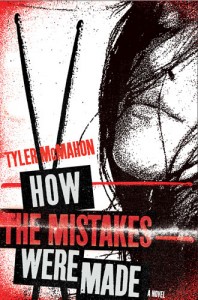 J. Caleb Winters: The 1980s Cold War mentality serves as a backdrop for the flashback chapters in How the Mistakes Were Made. In one chapter you write, “All holidays are haunted by threat…some older kid always asks out loud if this will be the last year in history.” Could you describe how the Cold War shaped Laura, Punk Rock, and the themes of the novel?
J. Caleb Winters: The 1980s Cold War mentality serves as a backdrop for the flashback chapters in How the Mistakes Were Made. In one chapter you write, “All holidays are haunted by threat…some older kid always asks out loud if this will be the last year in history.” Could you describe how the Cold War shaped Laura, Punk Rock, and the themes of the novel?
Tyler McMahon: It’s interesting that you bring that up. I often feel like I avoid early childhood more than the average fiction writer. But that element is one thing that I definitely mined from my own youth.
All my earliest memories involve being terrified by some sort of nuclear apocalypse. I would have nightmares about it all the time. I’d wake up in the middle of the night and cry about it. So many childhood sleepovers ended with somebody’s older brother or sister whispering about how the bombs worked—if they used keys or buttons, if the president could launch them from his limo, how big they were and what shape they had. There was something on television back then, maybe one of those Amazing Stories bits, in which all the nukes were fired and a little boy runs outside and screams “Stop!” and the missiles all froze in midair. I remember identifying with that at a young age.
For many years, I thought I was just paranoid or a coward. Then one day when I was in my twenties, my father told me a story about a college lecture he attended. I believe they were talking about the Cuban missile crisis. The professor was absolutely certain there would be a nuclear war between the US and the USSR in the next few years. My dad talked about how unsettling that was. After that, I realized it was a symptom of an age, not just my own psychological flaw.
I definitely think the nuclear threat was a significant factor in punk rock’s genesis, and in American hardcore especially. That’s a position I argued for often when I taught my rock history class to undergrads. I’ll concede that it might be too neat of a thesis, as a lot of bad stuff happened to the US in the 80s. But in the case of punk, it rings true.
When I began writing in Laura’s voice, she immediately had this tough, two-fisted, tomboy exterior. It became doubly important to give her some kind of soft underbelly, an inner frailty. The fear of nuclear weapons felt like a good fit. It helped place those flashbacks, both in a specific time and in D.C.
I’ve always felt that adolescence during the Cold War was like adolescence on steroids. It’s hard enough to be a teenager and deal with the difficult realization that the grown-ups don’t know what they’re doing; but when the grown-ups have nuclear weapons aimed at each other…then it’s a whole different ball game.
I try to remind myself that every human generation has feared that it will be the last. I guess there’s always been religious eschatology, but then you usually get an afterlife or something to look forward to. And those sorts of apocalypses are considered inevitable, written into history from creation. With the Cold War, it was all due to human error.
It’s fascinating to talk about this stuff with college freshman nowadays. They’ve grown up in the shadow of 9/11; that’s the Fear Narrative that’s been thrust upon them. A part of me thinks that it’s worse, as it actually happened; it’s not as nebulous as what I grew up with. Another part of me realizes that we survived 9/11, that we could survive another one if we had to. Thermonuclear war was supposed to vaporize all human life in an instant.
I suppose it’s more likely that some sort of fear vacuum is built into our brains, and demands to be filled with four horsemen or bombs or terrorists. Or perhaps that vacuum is drilled into us by whoever profits most from those fears. Whatever the cause, I do think it’s real, and that it affects young people most severely.
How the Mistakes Were Made is getting some excellent reviews from music industry insiders. Could you explain how you researched your novel?
The seeds got planted when I was a Teaching Assistant in graduate school. I designed a first-year writing and research course themed around the history of rock and roll. At the time, I didn’t see this course as having anything to do with my fiction writing. But as I got deeper into the material, and inundated myself with music history and documentary footage, it blossomed into a minor obsession. This all happened to coincide with a time in which I was struggling to understand the novel as a form, so I may have brought a kind of tunnel vision to the subject matter.
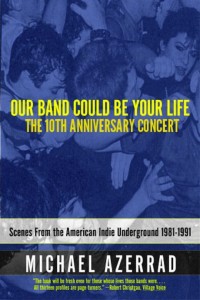 I was blown away by Michael Azerrad’s incredible nonfiction books: Come as You Are, and Our Band Could Be Your Life. The lines that he draws between hardcore punk and Seattle grunge were, in many ways, the impetus for Laura’s character, and my novel as a whole. How the Mistakes Were Made might not exist without Azerrad’s work.
I was blown away by Michael Azerrad’s incredible nonfiction books: Come as You Are, and Our Band Could Be Your Life. The lines that he draws between hardcore punk and Seattle grunge were, in many ways, the impetus for Laura’s character, and my novel as a whole. How the Mistakes Were Made might not exist without Azerrad’s work.
Once I knew the story in a big picture sense, I found myself taking on a whole second wave of research aimed at making the details convincing. Many scenes take place in cities that I’m only vaguely familiar with, so I spent hours pouring over online maps and bus schedules. I also had to include a lot of technical jargon about recording and the music business. (I don’t know how fiction writers did it before the Internet.) Finally, I ended up tagging along with a San Francisco band called Poor Man’s Whiskey on several tours of Northern California, Oregon, and Washington. For weeks, I slept on a bus with five dirty musicians soaking up the lingo and the lifestyle—all in the name of research.
I have to admit: sending the book to actual music figures and industry people still scares the hell out of me. It’s something I never considered while writing it. I feel so fortunate that the feedback has been positive thus far, and that most of those who lived through these scenes find some resonance with their own experiences.
You write so wonderfully about the experience of performing music, you must be an accomplished musician. Did you play any shows with Poor Man’s Whiskey?
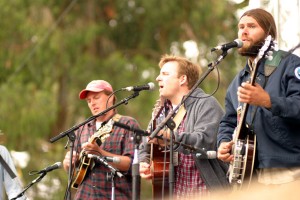 My live show experience with Poor Man’s Whiskey is limited to a single keg party in Hood River, Oregon, in which I sat in on the Green Suitcase—PMW’s satellite percussion section. And that wasn’t the actual band, but rather a one-night side project known as Like a Sturgeon. It was one of the best nights of my life, but didn’t lead to a permanent position in the lineup.
My live show experience with Poor Man’s Whiskey is limited to a single keg party in Hood River, Oregon, in which I sat in on the Green Suitcase—PMW’s satellite percussion section. And that wasn’t the actual band, but rather a one-night side project known as Like a Sturgeon. It was one of the best nights of my life, but didn’t lead to a permanent position in the lineup.
Unfortunately, I’m not much of an accomplished musician. I could play the drums passably well in high school, jammed for many hours in the basement, and played some shows at community centers. That’s where I get most of my first-hand knowledge—the nerves and the exhilaration, the sweating armpits and ringing ears. George, the drummer from PMW, sometimes had me bang on his drums during sound-check. The last time I did that I couldn’t even play a proper beat. It was thoroughly depressing.
With a guitar, I can fake my way through a dozen campfire songs, but I don’t seem to have any real aptitude for that instrument. I’m kind of a musical dabbler, a hobbyist. I don’t know any theory, and I suspect I might be tone-deaf. As a teenager, I was handy with equipment, and used to fix amps and guitars for my friends. I liked to make crude PA systems out of old stereos, that sort of thing. I think I developed an odd fascination with the analog electronics associated with music that helped me write this novel.
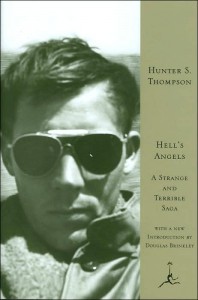 I’ve come to believe that my less-than-expert musicianship was actually an asset. The example I often look to is Hunter S. Thompson’s book about the Hell’s Angels. He has one foot in and one foot out of that subculture. He rides motorcycles with the Angels, and speaks the lingo, but he isn’t quite one of the gang. A bit of awe and curiosity can fuel a writer’s interest, and offer a better perspective.
I’ve come to believe that my less-than-expert musicianship was actually an asset. The example I often look to is Hunter S. Thompson’s book about the Hell’s Angels. He has one foot in and one foot out of that subculture. He rides motorcycles with the Angels, and speaks the lingo, but he isn’t quite one of the gang. A bit of awe and curiosity can fuel a writer’s interest, and offer a better perspective.
Is there any difference in writing short stories vs. writing a novel? Do you enjoy one form more than another?
Well, I wouldn’t consider myself an expert in either form, but they’ve definitely been different, in my experience. Learning about novels—from a craft perspective—was an amazing educational experience for me. I’ve been trying to write fiction since I was 18 or 19, and didn’t get serious about novels until my early thirties. So I stumbled upon novel writing as this incredible space for artistic growth, which built on skills I’d been trying to acquire for years beforehand. It was invigorating, like a musician suddenly learning three new chords.
I’ve found it suits my personality better than shorter pieces. I’m a slow, grinding kind of writer. Having a narrator and a premise that I can wake up to and spend time with over the course of years functions like an escape for me. There’s less pressure for innovation or completion. And I seem to be prone to these fleeting obsessions that last about sixteen months—which jives nicely with novel writing.
But I certainly don’t believe that short stories are somehow a primer or first-step for writing novels. Being a short-story writer is a prospect I find terrifying, to be honest. Short fiction is very difficult to master, or even to be competent at. With novels, I feel like I can hide behind the story a little more. The pressure seems to be more on the book than the talent.
I think about this a lot, now that I teach fiction to undergraduates. It saddens me that some students dismiss short stories as obsolete or irrelevant. Almost everything I know about writing comes from short stories—reading them and writing them. I feel very lucky to have been educated in that form, even if I haven’t written one in a while.
You mention you’re a “slow, grinding kind of writer.” Could you elaborate more on your writing process?
If I had to sum up my process in two words, it would be “not spontaneous.” I like to write in the same time and place everyday, usually not for more than two or three hours at a stretch. I’m easily disheartened, so I try to keep the blank-page process and the self-editing process as separate as possible. I write everything out longhand first, mainly because I find I’m less inhibited on paper than on screen—less inclined to second-guess whatever I put down. I also think there’s an illusion of linear progress with pen and paper that’s harder to maintain with a word processor.
I read an interview with Nick Cave in which he said something along the lines of “I don’t rely on inspiration; it is unreliable. I wake up every morning and I work.” That describes me pretty well. I might scribble down the odd phrase or idea during the rest of the day, but generally I prefer my writing time to be like church: sacred, highly ritualistic, and not too long.
Lately, it’s become important to me to try and enjoy the novels as I’m working on them. Even when it’s difficult, I try to think of the work as a respite or indulgence, a place where I’m not touched by other daily tribulations. That’s harder to do once the writing gets into the hands of others. When I’m responding to feedback from editors or whoever, then it’s different. I work all day, worry a lot, don’t have as much fun. That part feels more like a job.
But I don’t mean to advocate for any particular approach. The more I read about how writers work, the more I realize that everyone writes in a different way. I’m very interested in process, and I always try to make my students conscious of the nuts and bolts of how and when they write.
In one of my favorite passages Laura poses an important question. She asks: “What is it that makes somebody a bad person? Is it your desires, these feelings that we can barely control? Or is it your actions, which urges you obey or deny?” Could you elaborate more on this idea? Is this something Laura truly believes? Is this something you truly believe?
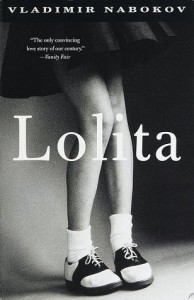 Certainly, part of the concept of the book is that Laura is an object of public hatred—a Yoko Ono or Courtney Love figure. The novel functions mostly as her defense, but I also wanted her to internalize some of those accusations, and to be introspective about her successes and failures as a human being. She earnestly looks back on the history of The Mistakes, and tries to understand what she might have done differently.
Certainly, part of the concept of the book is that Laura is an object of public hatred—a Yoko Ono or Courtney Love figure. The novel functions mostly as her defense, but I also wanted her to internalize some of those accusations, and to be introspective about her successes and failures as a human being. She earnestly looks back on the history of The Mistakes, and tries to understand what she might have done differently.
In that passage, I suppose she’s asking whether it’s enough to have a good heart, or if good is as good does. I’m sure the philosophers have more exact terms to describe this conflict.
I don’t think Laura ever completely buys the black-and-white moral compass that the fans hold her to. But she does believe in the effects of acting or not acting. Without spoiling anything, I’ll say that what Laura comes to realize in that scene is that all the desires she acted upon were real and powerful. Her only other option was repression.
I was heavily under the influence of Lolita when I started The Mistakes. Though never as much of a monster as Humbert Humbert, Laura was originally much older than Sean and Nathan. She had terms for boys like them, the way Humbert has ‘nymphets.’ Almost all of that came out in the editorial wash, but those asides she has to the fans and press (of which that passage is one), are completely ripped off from Humbert’s “Ladies and gentlemen of the jury…” lines. (If I remember correctly, many of the names of the fake venues that The Mistakes play are adapted from the hotel names and other things in Lolita.)
I could never pull off a narrator like Humbert. But in a small, watered-down way, I like to think that Laura’s dilemma is somewhat akin to his: the inhibition or expression of a forbidden desire.
Who has influenced you as a writer?
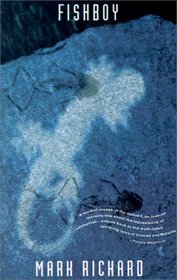 By the far the most enduring influence on me—from the time I first started writing stories—is Denis Johnson. His work is something I still return to often, and have never gotten over. Mark Richard’s fiction was extremely important to me as a young writer, especially Fishboy, and Ice at the Bottom of the World. He’s still one of the most original and unique writers I can think of.
By the far the most enduring influence on me—from the time I first started writing stories—is Denis Johnson. His work is something I still return to often, and have never gotten over. Mark Richard’s fiction was extremely important to me as a young writer, especially Fishboy, and Ice at the Bottom of the World. He’s still one of the most original and unique writers I can think of.
Before I got serious about writing, Hemingway and Steinbeck particularly moved me. I’ve always had a fondness for expat novels, for some reason.
A strange and wonderful novel called Straight Through the Night by Edward Allen came into my life at a very formative stage. The scene in The Mistakes when Laura burns a one-dollar bill is my homage to that amazing book.
More recently—especially since I started focusing on writing novels—I’ve felt a strong affinity for Russell Banks. In a weird way, I feel like I’ve spent the last few years working in a style that emulates his. The verisimilitude and the timbre of the prose in The Mistakes seem to aspire towards his style, more than anyone else’s—at least to my mind. I say it’s weird because I don’t remember ever making that decision. It’s more like a space that I happened to be comfortable working in.
Lately there has been a lot of press about M.F.A. programs and much of it is negative. How would you describe your experience at Boise State University’s M.F.A program? Do you think any of the criticisms about M.F.A. programs are valid? Do they just crank out “cookie cutter” writers?
My experience at BSU was somewhat typical and somewhat unique. Certainly, the classes, the demographic of students, the teaching load, the readings and parties and stuff—were all industry standard. But BSU was a small, young program then. We certainly never had access to agents or people in publishing or whatnot—beyond the level of the small press or literary journal. Maybe that’s not so unusual, but I bring it up to emphasize that it was a craft-based environment. I learned a lot as a graduate student, more than I expected to. I don’t believe I could’ve written The Mistakes without the skills I got there. Frankly, even if I was independently wealthy and could spend ten years reading and writing in a cabin by myself—I still don’t believe I’d have learned as much.
I’ve largely stayed on the sidelines during the recent kerfuffle over MFA programs. I haven’t read The Program Era, though I did read some interviews with the author and found his insights to be interesting and balanced. I thought the NYC/MFA article also was full of good points and several brilliant observations. In general, I think Creative Writing programs have become old enough and big enough that they should expect to be questioned in a serious way.
But I don’t have much patience for critics who condemn MFA programs based on a few books they didn’t enjoy. That’s a practice I find deeply flawed. Anyone who’s thinking about the author’s grad program while reading a novel should reconsider his or her approach to reading fiction. With all their assistantships and fellowships, writing programs form perhaps the most effective patronage system that we have for emerging literature in this country. So I think it’s misleading to frame it as a purely aesthetic issue.
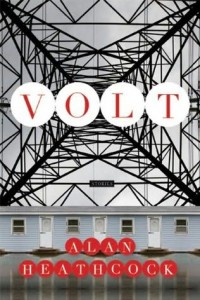 Frankly, I’m not sure the cookie-cutter accusation holds up against any real scrutiny. The last two books by graduates of my program are Alan Heathcock’s and my own. His story collection, VOLT, is an incredible book that’s had a tremendous reception, but I don’t think anybody would say that it’s similar to The Mistakes. He finished grad school just as I started, but we had basically the exact same teachers and the exact same classes. We were subject to the same cutter; so why are our cookies so different? If you really want to see some homogenous, risk-averse literature, then let the market take over completely.
Frankly, I’m not sure the cookie-cutter accusation holds up against any real scrutiny. The last two books by graduates of my program are Alan Heathcock’s and my own. His story collection, VOLT, is an incredible book that’s had a tremendous reception, but I don’t think anybody would say that it’s similar to The Mistakes. He finished grad school just as I started, but we had basically the exact same teachers and the exact same classes. We were subject to the same cutter; so why are our cookies so different? If you really want to see some homogenous, risk-averse literature, then let the market take over completely.
It’s hard to be an outspoken champion of such programs, because they do have their issues. And I was no MFA darling; I barely got into grad school at all. But we live in a culture with a long tradition of gutting public support for artists and the arts; that’s a bandwagon I simply can’t get behind. I tend to agree with what David Berman said, when asked a similar question: “Let the kids write; some of them will blow your mind.” Even if most of their books suck, that’s still a price I’m willing to pay to have my mind blown once in a while.
You’re a male writer, yet The Mistakes is written from a female perspective. Do you think it’s risky writing from a point of view that is different from one’s own?
Risky is a good word for it. At least it felt that way at the start. I’d worked with female protagonists before, but never in first person. I remember thinking that if I made Laura enough of a tomboy, I might get away with it—an idea that sounds utterly ridiculous to me now.
From very early on, it was obvious that the narrator of this book had to be a woman. Still, I don’t see how the story could function without Laura telling it. So I took it on as a necessary challenge. And I really enjoyed the voice she has: short, simple sentences spiked with sarcasm. It was refreshing and fun. But once I did start showing it to people, I was mortified that I might not have gotten Laura right. I’m lucky that my early readers were all kind and constructive. I was so sensitive about the female-narrator thing; if they’d been dismissive or told me I didn’t understand how women think, I might’ve scrapped the whole project.
Looking back, writing this way was an incredibly important lesson for me. Above all else, the pressure I felt was to make Laura convincing. In literary fiction circles, we emphasize characterization—for good reason. But I think we can sometimes erroneously interpret that emphasis as meaning we must invent highly original or unique characters. Working in Laura’s voice, I learned it was more important that she be believable than original.
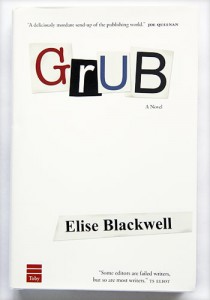 When I was in the early stages of The Mistakes, I read Elise Blackwell‘s Grub—which is a brilliant satire of publishing and fiction writers. It includes a gifted young writer character that spends years on his opus—narrated by a woman. In a hilarious scene, a bunch of readers grumble about his novel.
When I was in the early stages of The Mistakes, I read Elise Blackwell‘s Grub—which is a brilliant satire of publishing and fiction writers. It includes a gifted young writer character that spends years on his opus—narrated by a woman. In a hilarious scene, a bunch of readers grumble about his novel.
One of their chief complaints is that it’s full of these long asides about menstruation. I remember reading that and thinking to myself: “I’m not going to mention menstruation in my novel.” It sounds silly, but it was actually this major moment of enlightenment. Like: it’s my book, I don’t have to go there if I don’t want to. More importantly: this is Laura’s story, not a showcase of my ability to write from a woman’s perspective.





